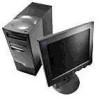IBM 6868 User Guide - Page 49
Wake on LAN, Alert on LAN, Remote Program Load or Dynamic Host Configuration Protocol
 |
UPC - 087944494911
View all IBM 6868 manuals
Add to My Manuals
Save this manual to your list of manuals |
Page 49 highlights
Wake on LAN Your computer has a Wake on LAN network adapter built into the system board. A network administrator can use the Wake on LAN feature to turn on your computer from a remote location. When Wake on LAN is used with network-management software, many types of functions, such as data transfers, software updates, and POST or BIOS updates to your computer can be initiated remotely. Note: If the computer power cord is plugged into a surge protector, make sure to use the computer power switch and not the surge protector switch when you turn off the power. Otherwise, the Wake on LAN feature will not work. Alert on LAN Your computer supports Alert on LAN technology. Alert on LAN technology provides notification of changes in the computer system even if the computer is turned off. Working with desktop management interface (DMI) and Wake on LAN technologies, Alert on LAN helps to manage and monitor the hardware and software features of your computer. Alert on LAN generates notifications when the internal computer components have been removed, an error is detected during POST, or the computer is disconnected from the network or unplugged from the electrical outlet. Alert on LAN works in conjunction with Universal Management Services. Remote Program Load or Dynamic Host Configuration Protocol A network administrator can use Remote Program Load (RPL) or Dynamic Host Configuration Protocol (DHCP) to control your computer. If you use RPL with software such as IBM LANClient Control Manager, you can use a feature called Hybrid RPL, to install hybrid images (or files) on the hard disk. If your computer is a Hybrid RPL client, each time the computer starts from the network, LANClient Control Manager downloads a small bootstrap program and avoids the network traffic associated with a standard RPL. Chapter 3. Operating and caring for your computer 35















